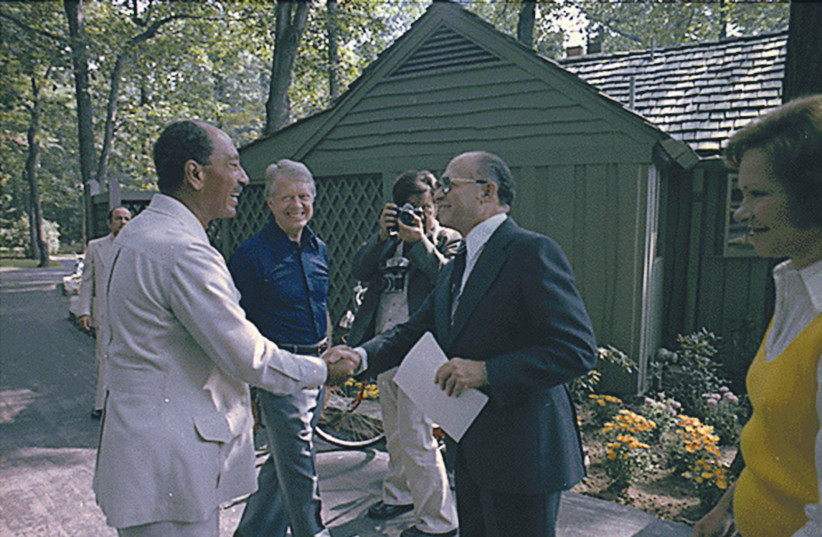In Prophets Without Honor, Shlomo Ben-Ami – foreign minister in the government led by Ehud Barak from 2000 to 2001; author, among other books, of Scars of War, Wounds of Peace: The Israeli-Arab Tragedy; and vice president of the Toledo International Center for Peace – provides a detailed, provocative, brilliant and somber analysis of attempts to resolve the Israeli-Palestinian conflict
He focuses primarily on the 2000 Camp David Summit, which he participated in at a high level, and the initiatives that followed it.
Prophets Without Honor delivers a brutally candid assessment of the principal negotiators at Camp David. “Neither a great strategist nor a brilliant statesman,” Ben-Ami writes, Yasser Arafat “was an alley cat, proficient in the art of survival, with a tactical cunning that frequently defeated his grand national vision.
“A rare combination of megalomania and inferiority, compulsively jealous of his honor and status,” Arafat used violence (like the Intifada) to advance political objectives but deemed any proposals that did not conform to the core narrative of the PLO on the right of return, Jerusalem, settlements, and a Palestinian state, a surrender.
And “he was always wrong” in calculating the concessions Israel was prepared to make.

A systems analyst, precise, calculating and orderly, and one of the most highly decorated soldiers in Israel’s history, Barak, according to Ben-Ami, had a grand strategic vision and the courage to try to implement an audacious peace plan. But he lacked emotional intelligence, sensitivity to cultural differences, was “proverbially maladroit as a politician,” and did not build domestic support for his policies.
US president Bill Clinton, Ben-Ami concludes, never took control of the events he was supposed to orchestrate at Camp David. In the absence of working papers with the broad outlines of an endgame (president Jimmy Carter circulated 23 of them at Camp David I), Clinton allowed the summit “to run itself practically leaderless, at the whims of the parties.”
As he documents the defects of Israeli and Palestinian leaders, however, Ben-Ami maintains that “the unbeatable impersonal forces of history” have repeatedly destined proposals for a two-state solution to fail.
Israelis and Palestinians, he reminds us, talk past each other, each “vying for the monopoly of victimhood,” each with its own language for “occupied” or “administered” territories, a West Bank or Judea and Samaria, Al Quds or Jerusalem, a right of return or a Law of Return.
A Palestinian state that “fell short of meeting dreams cultivated over long years of exile and destitution,” Ben-Ami observes, was likely to be rejected by a majority of Palestinians and ignite a civil war between Hamas and the PLO.
An agreement acceptable to Palestinians, with massive evacuation of settlers and a return to what Abba Eban once called the pre-1967 “Auschwitz borders” would almost certainly stimulate a “sociopolitical earthquake” in Israel.
Although Ben-Ami thinks former prime minister Benjamin Netanyahu is a “cynical manipulator,” he acknowledges that he has embodied the views of a majority of Israelis and their political parties: fear and contempt for Palestinians and a conviction that they will never accept the legitimacy of the State of Israel. And so, as prime minister, Netanyahu felt free to expand settlements, prioritize security, neutralize Palestinians with “spatial shaping” of the West Bank, and concentrate on the existential threat posed by Iran.
After laying out reasons a single binational state would be a disaster, Ben-Ami suggests that a confederation of Palestinians with Jordan is the best option for resolving the conflict, if only because “if all we ever do is all we have ever done, then all we will ever get is all we ever got, and possibly worse.”
As this tepid endorsement indicates, Ben-Ami understands that the time is not now propitious for serious negotiations. Given a disintegrating world order, the demise of multilateralism, decline of American superpower hegemony, and “more urgent” concerns (the rise of extremism, the fragility of Western democracies, trade wars, China’s global ambitions, mass migrations, the coronavirus pandemic, and impending climate catastrophe), he writes, the “international community,” such as it is, “is in no mood to spare any energy” for the Israeli-Palestinian conflict.
Moreover, Ben-Ami maintains, an enduring solution cannot emerge until and unless Israelis confront head-on the view of the annexationist Right, “glutted with divine certainty and exhilaration of victory,” that Palestinians are history’s losers, who do not deserve their own country or “admission as brothers in the fellowship of people.”
And it cannot emerge until and unless Palestinians undergo “a long overdue process of national renewal and political soul-searching,” which includes recognition that “anger is not a strategy” and that serial rejections of “reasonable peace plans” have betrayed a “despairing incapacity to turn historical conjunctures into opportunities.”
Meanwhile, Ben-Ami concludes, “the peace process has devoured all its sons and daughters,” but unlike Cronus, father of the Olympic gods, “has not vomited all of them alive.” Goodwill, platitudinous sentiments, massive international financial aid for the Palestinians, facile analogies to anti-colonial struggles that ignore differences between overseas “possessions” and occupied lands that are contiguous with and affect the security of the “home territory,” weariness in the Arab world and condemnations of Israel persist.
Realities that, alas, “Israel has learned to live with.” ■
